Agency Law: Exploring Agent Types, Authority, and Case Studies
VerifiedAdded on 2020/01/23
|10
|3321
|75
Report
AI Summary
This report provides a comprehensive overview of agency law, a crucial area of commercial law that governs relationships where one party (the agent) acts on behalf of another (the principal). The report begins with an introduction to the importance of agency law, highlighting its role in allowing corporations to act, protecting shareholder interests, and defining the responsibilities of businesses and their employees. It then defines agency law and outlines its key features, including its role in understanding employee relationships and establishing contractual and non-contractual relationships. The main body of the report delves into different types of agents, differentiating between those based on consent (express and implied actual authority) and those not based on consent (apparent authority). Case studies, such as Woodhouse A.C. Israel Cocoa Ltd v Nigerian Product Marketing Co Ltd and Hely-Hutchinson v Brayhead Ltd, are used to illustrate the concepts. The report explores the nuances of each type of authority and the legal implications of agency relationships. The report concludes by summarizing the key concepts and their relevance in legal and business contexts.
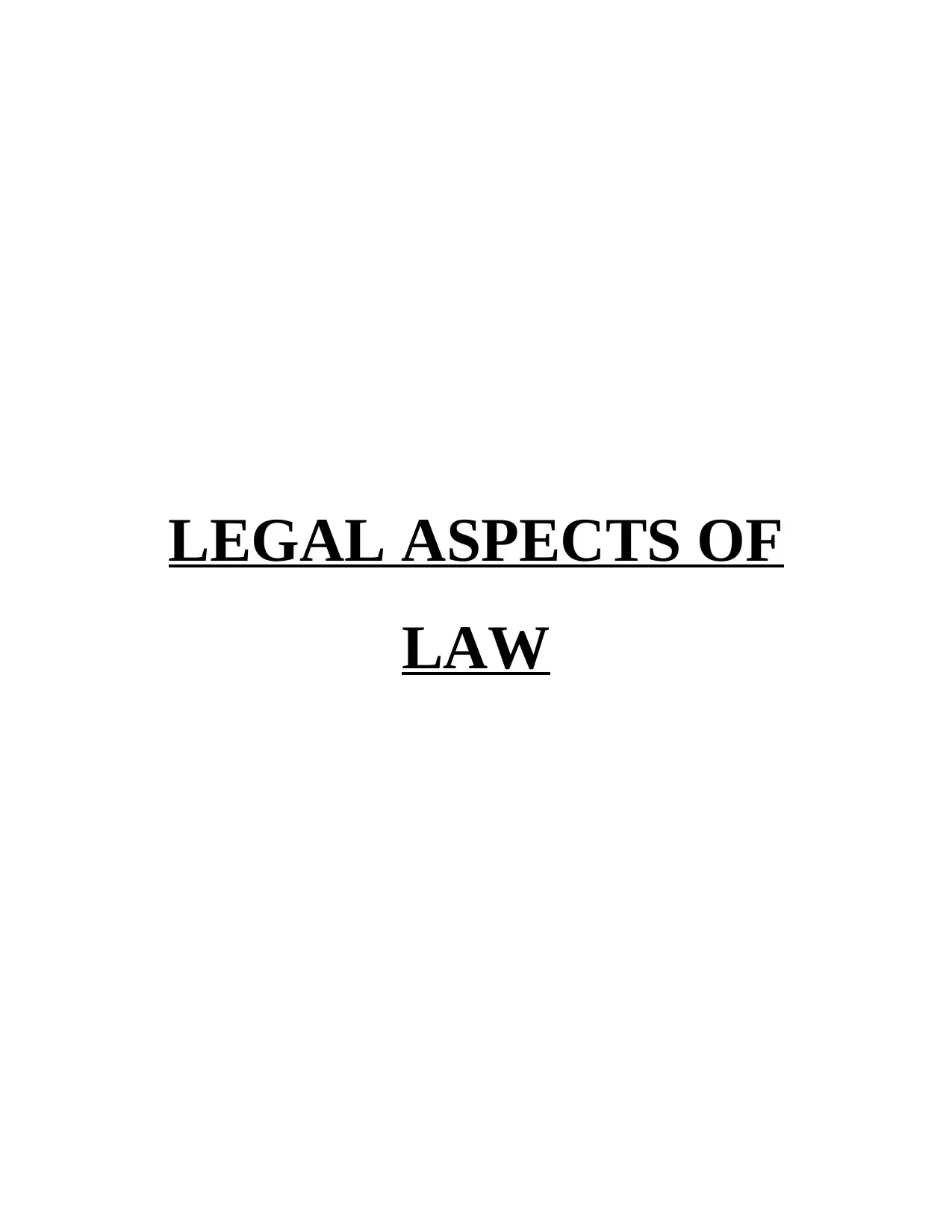
LEGAL ASPECTS OF
LAW
LAW
Paraphrase This Document
Need a fresh take? Get an instant paraphrase of this document with our AI Paraphraser
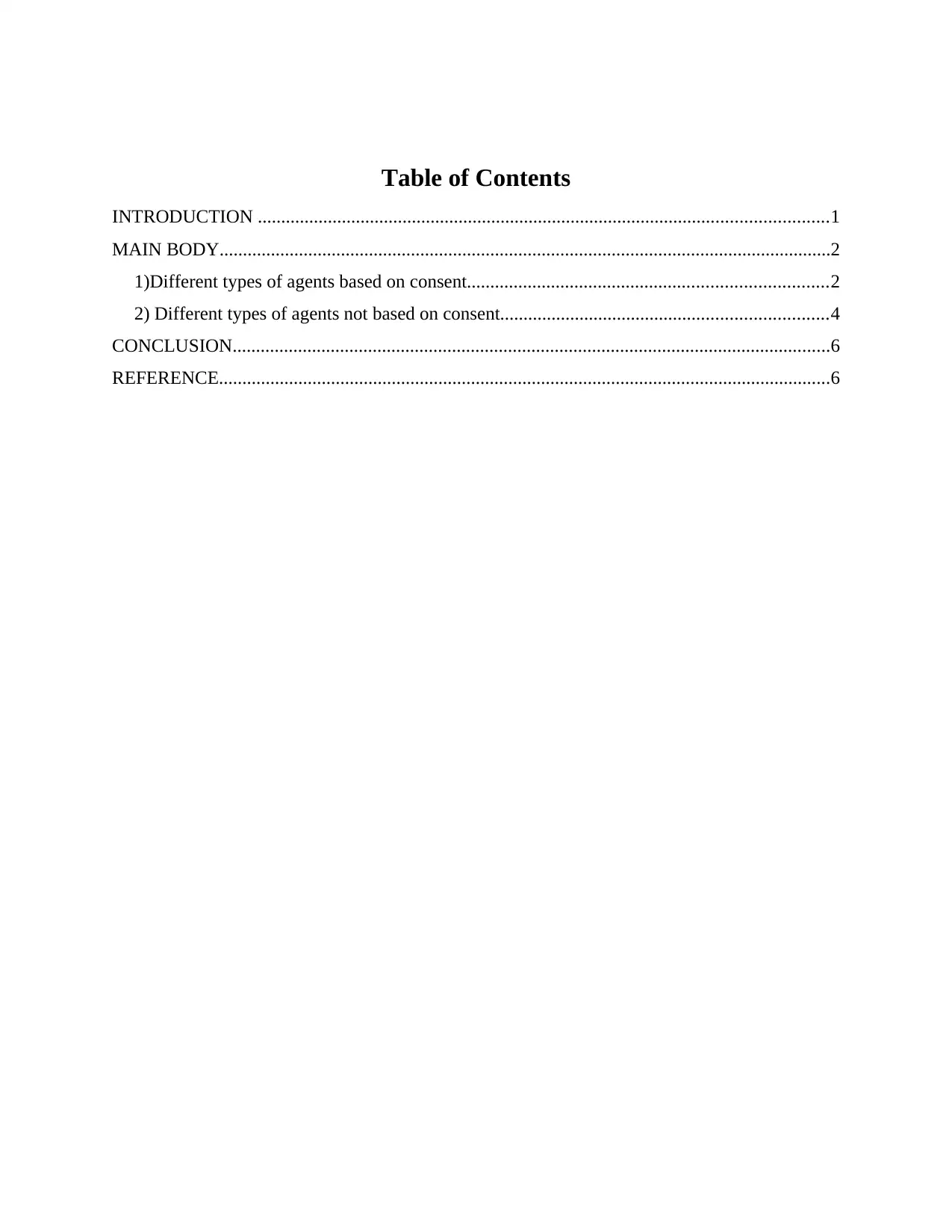
Table of Contents
INTRODUCTION ..........................................................................................................................1
MAIN BODY...................................................................................................................................2
1)Different types of agents based on consent.............................................................................2
2) Different types of agents not based on consent......................................................................4
CONCLUSION................................................................................................................................6
REFERENCE...................................................................................................................................6
INTRODUCTION ..........................................................................................................................1
MAIN BODY...................................................................................................................................2
1)Different types of agents based on consent.............................................................................2
2) Different types of agents not based on consent......................................................................4
CONCLUSION................................................................................................................................6
REFERENCE...................................................................................................................................6
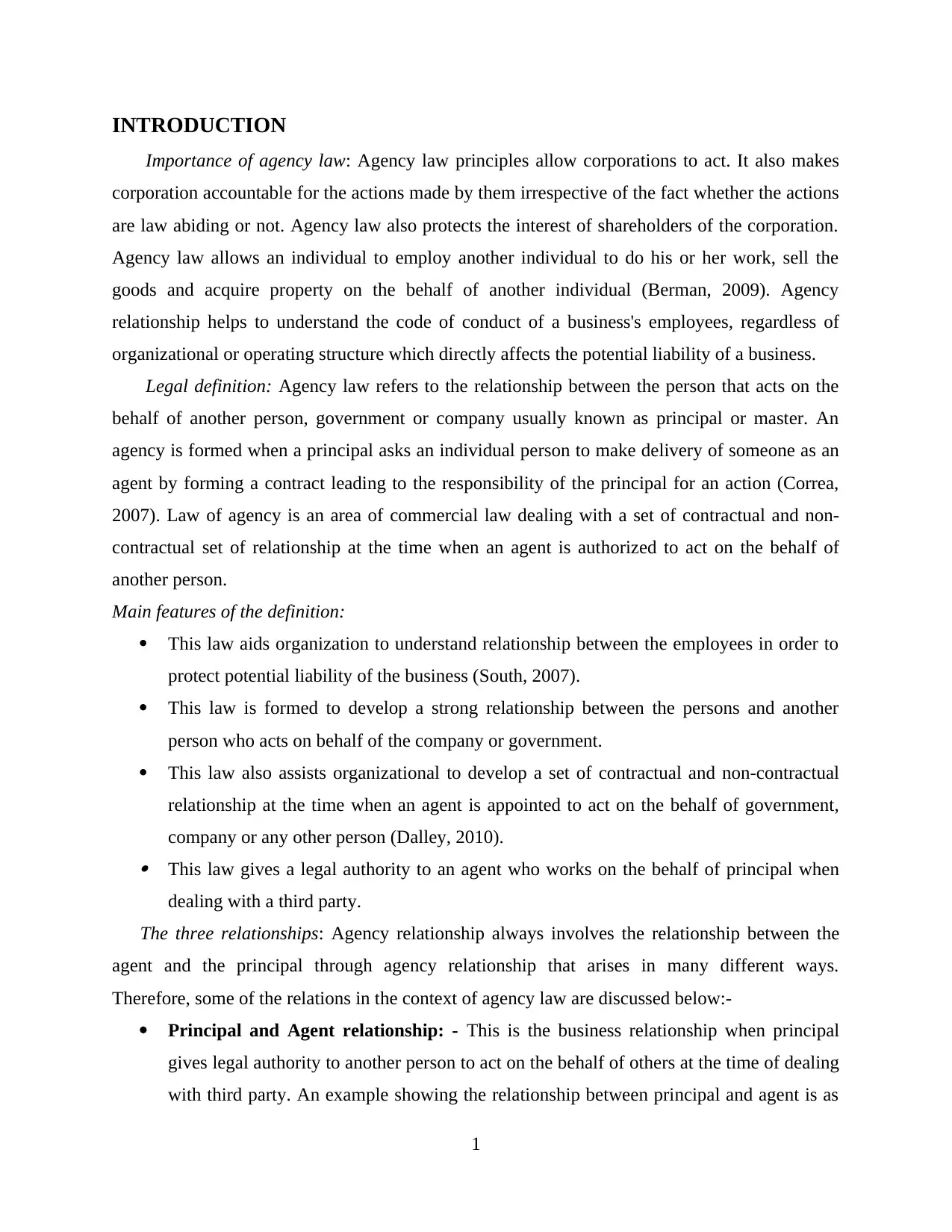
INTRODUCTION
Importance of agency law: Agency law principles allow corporations to act. It also makes
corporation accountable for the actions made by them irrespective of the fact whether the actions
are law abiding or not. Agency law also protects the interest of shareholders of the corporation.
Agency law allows an individual to employ another individual to do his or her work, sell the
goods and acquire property on the behalf of another individual (Berman, 2009). Agency
relationship helps to understand the code of conduct of a business's employees, regardless of
organizational or operating structure which directly affects the potential liability of a business.
Legal definition: Agency law refers to the relationship between the person that acts on the
behalf of another person, government or company usually known as principal or master. An
agency is formed when a principal asks an individual person to make delivery of someone as an
agent by forming a contract leading to the responsibility of the principal for an action (Correa,
2007). Law of agency is an area of commercial law dealing with a set of contractual and non-
contractual set of relationship at the time when an agent is authorized to act on the behalf of
another person.
Main features of the definition:
This law aids organization to understand relationship between the employees in order to
protect potential liability of the business (South, 2007).
This law is formed to develop a strong relationship between the persons and another
person who acts on behalf of the company or government.
This law also assists organizational to develop a set of contractual and non-contractual
relationship at the time when an agent is appointed to act on the behalf of government,
company or any other person (Dalley, 2010). This law gives a legal authority to an agent who works on the behalf of principal when
dealing with a third party.
The three relationships: Agency relationship always involves the relationship between the
agent and the principal through agency relationship that arises in many different ways.
Therefore, some of the relations in the context of agency law are discussed below:-
Principal and Agent relationship: - This is the business relationship when principal
gives legal authority to another person to act on the behalf of others at the time of dealing
with third party. An example showing the relationship between principal and agent is as
1
Importance of agency law: Agency law principles allow corporations to act. It also makes
corporation accountable for the actions made by them irrespective of the fact whether the actions
are law abiding or not. Agency law also protects the interest of shareholders of the corporation.
Agency law allows an individual to employ another individual to do his or her work, sell the
goods and acquire property on the behalf of another individual (Berman, 2009). Agency
relationship helps to understand the code of conduct of a business's employees, regardless of
organizational or operating structure which directly affects the potential liability of a business.
Legal definition: Agency law refers to the relationship between the person that acts on the
behalf of another person, government or company usually known as principal or master. An
agency is formed when a principal asks an individual person to make delivery of someone as an
agent by forming a contract leading to the responsibility of the principal for an action (Correa,
2007). Law of agency is an area of commercial law dealing with a set of contractual and non-
contractual set of relationship at the time when an agent is authorized to act on the behalf of
another person.
Main features of the definition:
This law aids organization to understand relationship between the employees in order to
protect potential liability of the business (South, 2007).
This law is formed to develop a strong relationship between the persons and another
person who acts on behalf of the company or government.
This law also assists organizational to develop a set of contractual and non-contractual
relationship at the time when an agent is appointed to act on the behalf of government,
company or any other person (Dalley, 2010). This law gives a legal authority to an agent who works on the behalf of principal when
dealing with a third party.
The three relationships: Agency relationship always involves the relationship between the
agent and the principal through agency relationship that arises in many different ways.
Therefore, some of the relations in the context of agency law are discussed below:-
Principal and Agent relationship: - This is the business relationship when principal
gives legal authority to another person to act on the behalf of others at the time of dealing
with third party. An example showing the relationship between principal and agent is as
1
⊘ This is a preview!⊘
Do you want full access?
Subscribe today to unlock all pages.

Trusted by 1+ million students worldwide
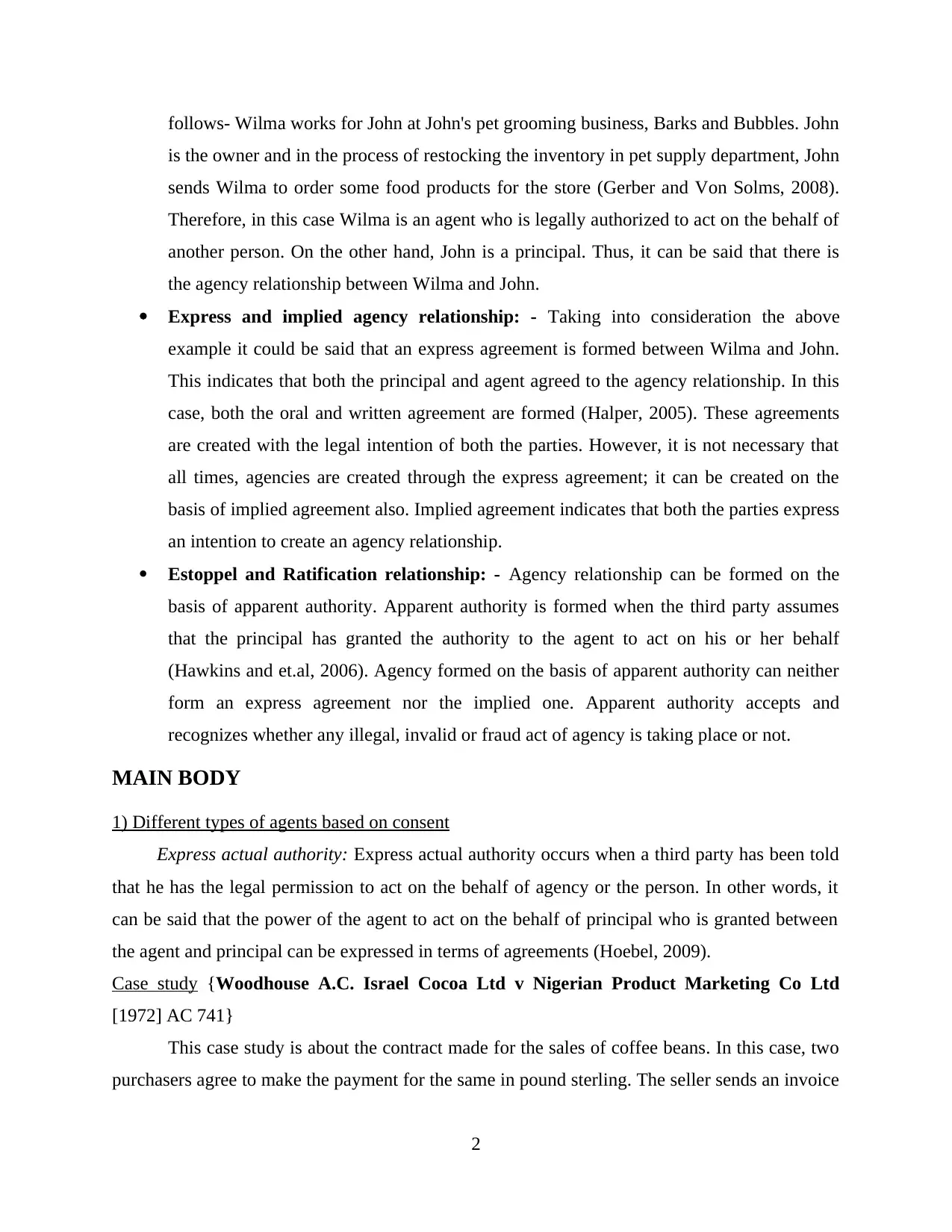
follows- Wilma works for John at John's pet grooming business, Barks and Bubbles. John
is the owner and in the process of restocking the inventory in pet supply department, John
sends Wilma to order some food products for the store (Gerber and Von Solms, 2008).
Therefore, in this case Wilma is an agent who is legally authorized to act on the behalf of
another person. On the other hand, John is a principal. Thus, it can be said that there is
the agency relationship between Wilma and John.
Express and implied agency relationship: - Taking into consideration the above
example it could be said that an express agreement is formed between Wilma and John.
This indicates that both the principal and agent agreed to the agency relationship. In this
case, both the oral and written agreement are formed (Halper, 2005). These agreements
are created with the legal intention of both the parties. However, it is not necessary that
all times, agencies are created through the express agreement; it can be created on the
basis of implied agreement also. Implied agreement indicates that both the parties express
an intention to create an agency relationship.
Estoppel and Ratification relationship: - Agency relationship can be formed on the
basis of apparent authority. Apparent authority is formed when the third party assumes
that the principal has granted the authority to the agent to act on his or her behalf
(Hawkins and et.al, 2006). Agency formed on the basis of apparent authority can neither
form an express agreement nor the implied one. Apparent authority accepts and
recognizes whether any illegal, invalid or fraud act of agency is taking place or not.
MAIN BODY
1) Different types of agents based on consent
Express actual authority: Express actual authority occurs when a third party has been told
that he has the legal permission to act on the behalf of agency or the person. In other words, it
can be said that the power of the agent to act on the behalf of principal who is granted between
the agent and principal can be expressed in terms of agreements (Hoebel, 2009).
Case study {Woodhouse A.C. Israel Cocoa Ltd v Nigerian Product Marketing Co Ltd
[1972] AC 741}
This case study is about the contract made for the sales of coffee beans. In this case, two
purchasers agree to make the payment for the same in pound sterling. The seller sends an invoice
2
is the owner and in the process of restocking the inventory in pet supply department, John
sends Wilma to order some food products for the store (Gerber and Von Solms, 2008).
Therefore, in this case Wilma is an agent who is legally authorized to act on the behalf of
another person. On the other hand, John is a principal. Thus, it can be said that there is
the agency relationship between Wilma and John.
Express and implied agency relationship: - Taking into consideration the above
example it could be said that an express agreement is formed between Wilma and John.
This indicates that both the principal and agent agreed to the agency relationship. In this
case, both the oral and written agreement are formed (Halper, 2005). These agreements
are created with the legal intention of both the parties. However, it is not necessary that
all times, agencies are created through the express agreement; it can be created on the
basis of implied agreement also. Implied agreement indicates that both the parties express
an intention to create an agency relationship.
Estoppel and Ratification relationship: - Agency relationship can be formed on the
basis of apparent authority. Apparent authority is formed when the third party assumes
that the principal has granted the authority to the agent to act on his or her behalf
(Hawkins and et.al, 2006). Agency formed on the basis of apparent authority can neither
form an express agreement nor the implied one. Apparent authority accepts and
recognizes whether any illegal, invalid or fraud act of agency is taking place or not.
MAIN BODY
1) Different types of agents based on consent
Express actual authority: Express actual authority occurs when a third party has been told
that he has the legal permission to act on the behalf of agency or the person. In other words, it
can be said that the power of the agent to act on the behalf of principal who is granted between
the agent and principal can be expressed in terms of agreements (Hoebel, 2009).
Case study {Woodhouse A.C. Israel Cocoa Ltd v Nigerian Product Marketing Co Ltd
[1972] AC 741}
This case study is about the contract made for the sales of coffee beans. In this case, two
purchasers agree to make the payment for the same in pound sterling. The seller sends an invoice
2
Paraphrase This Document
Need a fresh take? Get an instant paraphrase of this document with our AI Paraphraser
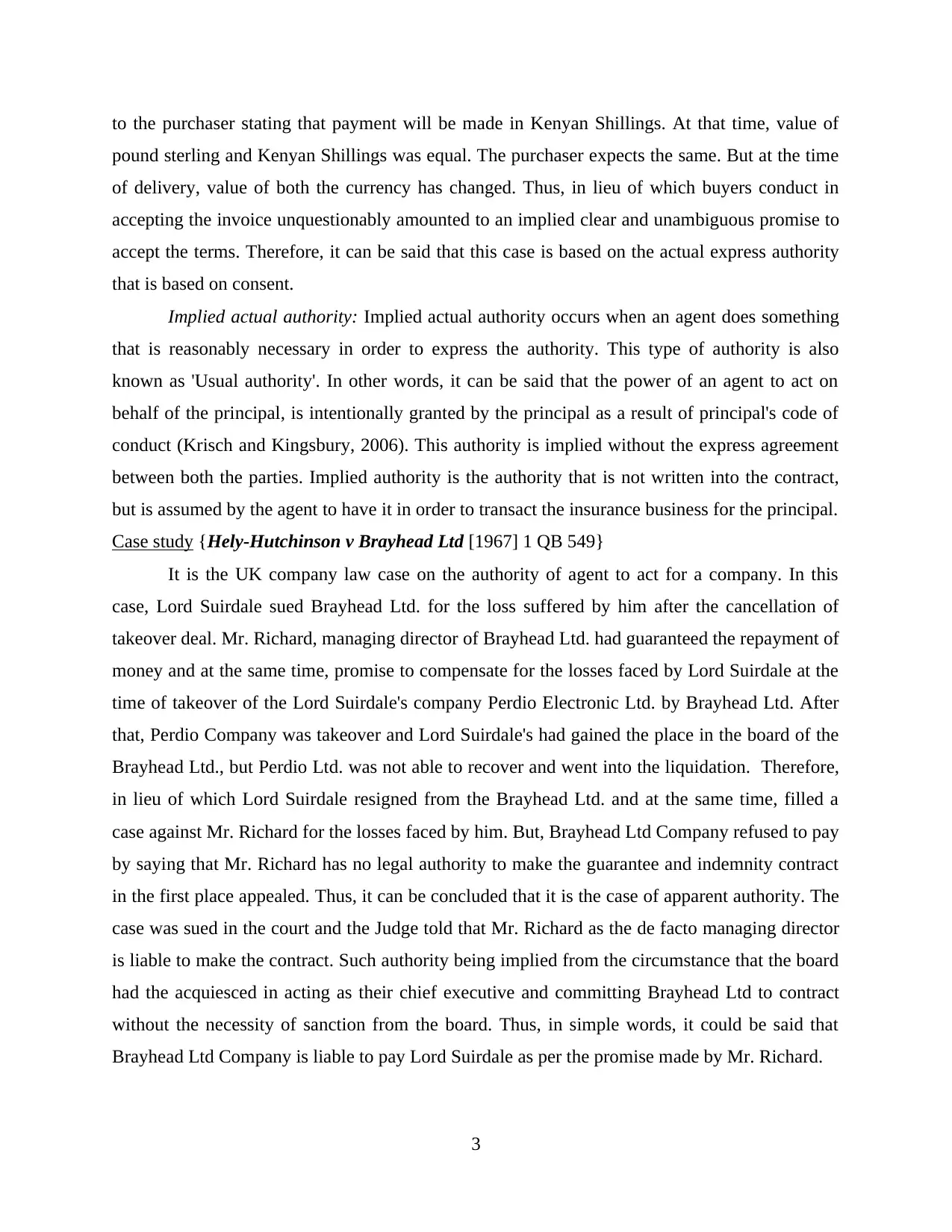
to the purchaser stating that payment will be made in Kenyan Shillings. At that time, value of
pound sterling and Kenyan Shillings was equal. The purchaser expects the same. But at the time
of delivery, value of both the currency has changed. Thus, in lieu of which buyers conduct in
accepting the invoice unquestionably amounted to an implied clear and unambiguous promise to
accept the terms. Therefore, it can be said that this case is based on the actual express authority
that is based on consent.
Implied actual authority: Implied actual authority occurs when an agent does something
that is reasonably necessary in order to express the authority. This type of authority is also
known as 'Usual authority'. In other words, it can be said that the power of an agent to act on
behalf of the principal, is intentionally granted by the principal as a result of principal's code of
conduct (Krisch and Kingsbury, 2006). This authority is implied without the express agreement
between both the parties. Implied authority is the authority that is not written into the contract,
but is assumed by the agent to have it in order to transact the insurance business for the principal.
Case study {Hely-Hutchinson v Brayhead Ltd [1967] 1 QB 549}
It is the UK company law case on the authority of agent to act for a company. In this
case, Lord Suirdale sued Brayhead Ltd. for the loss suffered by him after the cancellation of
takeover deal. Mr. Richard, managing director of Brayhead Ltd. had guaranteed the repayment of
money and at the same time, promise to compensate for the losses faced by Lord Suirdale at the
time of takeover of the Lord Suirdale's company Perdio Electronic Ltd. by Brayhead Ltd. After
that, Perdio Company was takeover and Lord Suirdale's had gained the place in the board of the
Brayhead Ltd., but Perdio Ltd. was not able to recover and went into the liquidation. Therefore,
in lieu of which Lord Suirdale resigned from the Brayhead Ltd. and at the same time, filled a
case against Mr. Richard for the losses faced by him. But, Brayhead Ltd Company refused to pay
by saying that Mr. Richard has no legal authority to make the guarantee and indemnity contract
in the first place appealed. Thus, it can be concluded that it is the case of apparent authority. The
case was sued in the court and the Judge told that Mr. Richard as the de facto managing director
is liable to make the contract. Such authority being implied from the circumstance that the board
had the acquiesced in acting as their chief executive and committing Brayhead Ltd to contract
without the necessity of sanction from the board. Thus, in simple words, it could be said that
Brayhead Ltd Company is liable to pay Lord Suirdale as per the promise made by Mr. Richard.
3
pound sterling and Kenyan Shillings was equal. The purchaser expects the same. But at the time
of delivery, value of both the currency has changed. Thus, in lieu of which buyers conduct in
accepting the invoice unquestionably amounted to an implied clear and unambiguous promise to
accept the terms. Therefore, it can be said that this case is based on the actual express authority
that is based on consent.
Implied actual authority: Implied actual authority occurs when an agent does something
that is reasonably necessary in order to express the authority. This type of authority is also
known as 'Usual authority'. In other words, it can be said that the power of an agent to act on
behalf of the principal, is intentionally granted by the principal as a result of principal's code of
conduct (Krisch and Kingsbury, 2006). This authority is implied without the express agreement
between both the parties. Implied authority is the authority that is not written into the contract,
but is assumed by the agent to have it in order to transact the insurance business for the principal.
Case study {Hely-Hutchinson v Brayhead Ltd [1967] 1 QB 549}
It is the UK company law case on the authority of agent to act for a company. In this
case, Lord Suirdale sued Brayhead Ltd. for the loss suffered by him after the cancellation of
takeover deal. Mr. Richard, managing director of Brayhead Ltd. had guaranteed the repayment of
money and at the same time, promise to compensate for the losses faced by Lord Suirdale at the
time of takeover of the Lord Suirdale's company Perdio Electronic Ltd. by Brayhead Ltd. After
that, Perdio Company was takeover and Lord Suirdale's had gained the place in the board of the
Brayhead Ltd., but Perdio Ltd. was not able to recover and went into the liquidation. Therefore,
in lieu of which Lord Suirdale resigned from the Brayhead Ltd. and at the same time, filled a
case against Mr. Richard for the losses faced by him. But, Brayhead Ltd Company refused to pay
by saying that Mr. Richard has no legal authority to make the guarantee and indemnity contract
in the first place appealed. Thus, it can be concluded that it is the case of apparent authority. The
case was sued in the court and the Judge told that Mr. Richard as the de facto managing director
is liable to make the contract. Such authority being implied from the circumstance that the board
had the acquiesced in acting as their chief executive and committing Brayhead Ltd to contract
without the necessity of sanction from the board. Thus, in simple words, it could be said that
Brayhead Ltd Company is liable to pay Lord Suirdale as per the promise made by Mr. Richard.
3
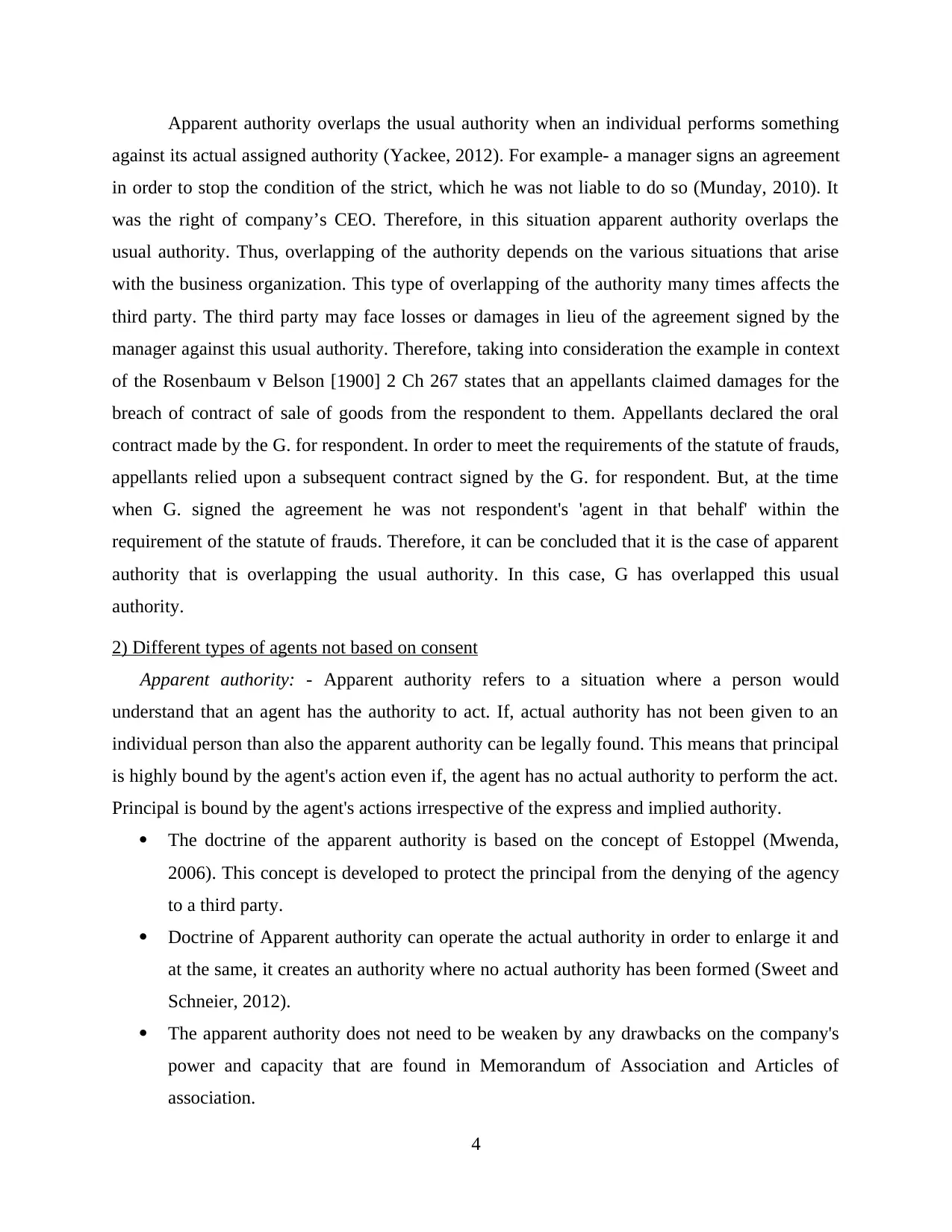
Apparent authority overlaps the usual authority when an individual performs something
against its actual assigned authority (Yackee, 2012). For example- a manager signs an agreement
in order to stop the condition of the strict, which he was not liable to do so (Munday, 2010). It
was the right of company’s CEO. Therefore, in this situation apparent authority overlaps the
usual authority. Thus, overlapping of the authority depends on the various situations that arise
with the business organization. This type of overlapping of the authority many times affects the
third party. The third party may face losses or damages in lieu of the agreement signed by the
manager against this usual authority. Therefore, taking into consideration the example in context
of the Rosenbaum v Belson [1900] 2 Ch 267 states that an appellants claimed damages for the
breach of contract of sale of goods from the respondent to them. Appellants declared the oral
contract made by the G. for respondent. In order to meet the requirements of the statute of frauds,
appellants relied upon a subsequent contract signed by the G. for respondent. But, at the time
when G. signed the agreement he was not respondent's 'agent in that behalf' within the
requirement of the statute of frauds. Therefore, it can be concluded that it is the case of apparent
authority that is overlapping the usual authority. In this case, G has overlapped this usual
authority.
2) Different types of agents not based on consent
Apparent authority: - Apparent authority refers to a situation where a person would
understand that an agent has the authority to act. If, actual authority has not been given to an
individual person than also the apparent authority can be legally found. This means that principal
is highly bound by the agent's action even if, the agent has no actual authority to perform the act.
Principal is bound by the agent's actions irrespective of the express and implied authority.
The doctrine of the apparent authority is based on the concept of Estoppel (Mwenda,
2006). This concept is developed to protect the principal from the denying of the agency
to a third party.
Doctrine of Apparent authority can operate the actual authority in order to enlarge it and
at the same, it creates an authority where no actual authority has been formed (Sweet and
Schneier, 2012).
The apparent authority does not need to be weaken by any drawbacks on the company's
power and capacity that are found in Memorandum of Association and Articles of
association.
4
against its actual assigned authority (Yackee, 2012). For example- a manager signs an agreement
in order to stop the condition of the strict, which he was not liable to do so (Munday, 2010). It
was the right of company’s CEO. Therefore, in this situation apparent authority overlaps the
usual authority. Thus, overlapping of the authority depends on the various situations that arise
with the business organization. This type of overlapping of the authority many times affects the
third party. The third party may face losses or damages in lieu of the agreement signed by the
manager against this usual authority. Therefore, taking into consideration the example in context
of the Rosenbaum v Belson [1900] 2 Ch 267 states that an appellants claimed damages for the
breach of contract of sale of goods from the respondent to them. Appellants declared the oral
contract made by the G. for respondent. In order to meet the requirements of the statute of frauds,
appellants relied upon a subsequent contract signed by the G. for respondent. But, at the time
when G. signed the agreement he was not respondent's 'agent in that behalf' within the
requirement of the statute of frauds. Therefore, it can be concluded that it is the case of apparent
authority that is overlapping the usual authority. In this case, G has overlapped this usual
authority.
2) Different types of agents not based on consent
Apparent authority: - Apparent authority refers to a situation where a person would
understand that an agent has the authority to act. If, actual authority has not been given to an
individual person than also the apparent authority can be legally found. This means that principal
is highly bound by the agent's action even if, the agent has no actual authority to perform the act.
Principal is bound by the agent's actions irrespective of the express and implied authority.
The doctrine of the apparent authority is based on the concept of Estoppel (Mwenda,
2006). This concept is developed to protect the principal from the denying of the agency
to a third party.
Doctrine of Apparent authority can operate the actual authority in order to enlarge it and
at the same, it creates an authority where no actual authority has been formed (Sweet and
Schneier, 2012).
The apparent authority does not need to be weaken by any drawbacks on the company's
power and capacity that are found in Memorandum of Association and Articles of
association.
4
⊘ This is a preview!⊘
Do you want full access?
Subscribe today to unlock all pages.

Trusted by 1+ million students worldwide
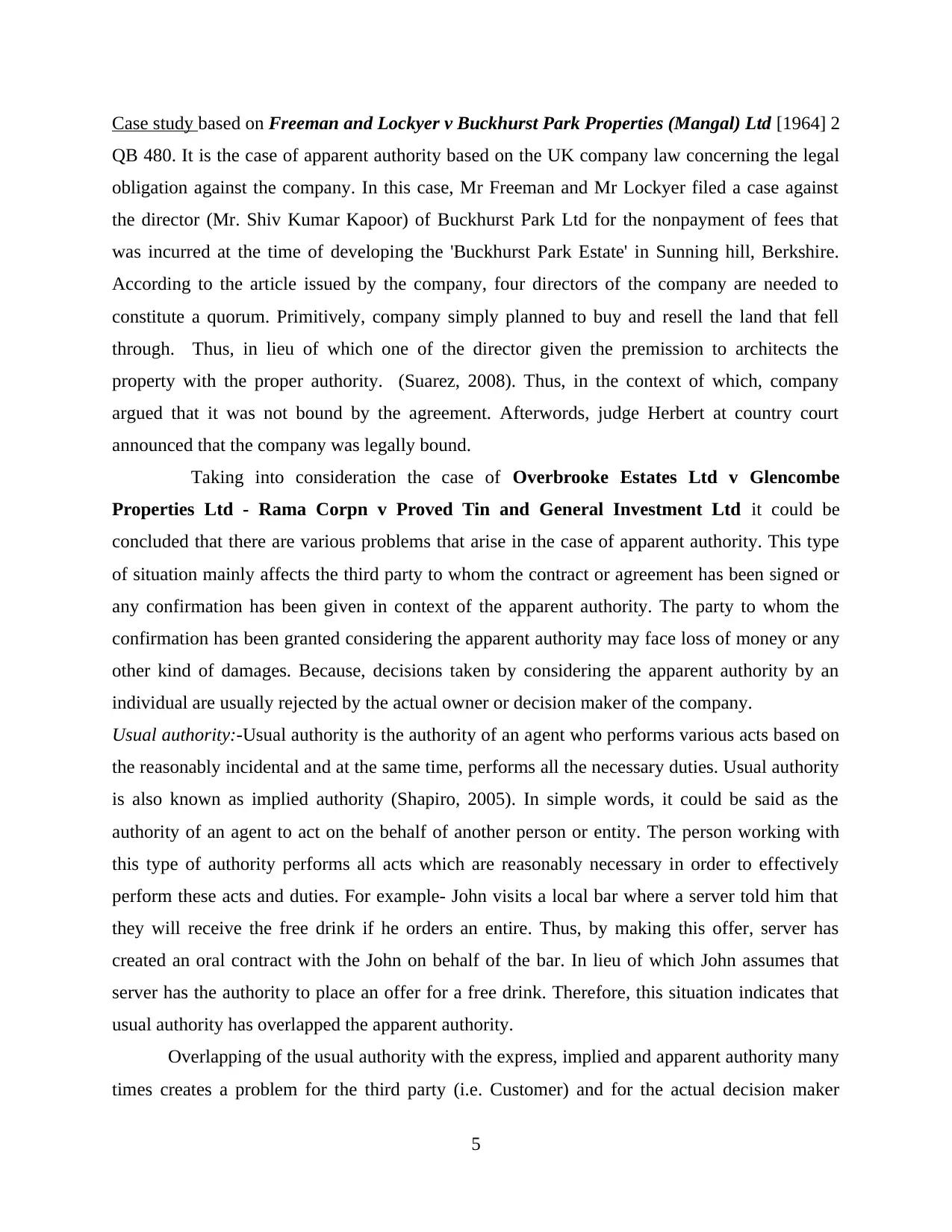
Case study based on Freeman and Lockyer v Buckhurst Park Properties (Mangal) Ltd [1964] 2
QB 480. It is the case of apparent authority based on the UK company law concerning the legal
obligation against the company. In this case, Mr Freeman and Mr Lockyer filed a case against
the director (Mr. Shiv Kumar Kapoor) of Buckhurst Park Ltd for the nonpayment of fees that
was incurred at the time of developing the 'Buckhurst Park Estate' in Sunning hill, Berkshire.
According to the article issued by the company, four directors of the company are needed to
constitute a quorum. Primitively, company simply planned to buy and resell the land that fell
through. Thus, in lieu of which one of the director given the premission to architects the
property with the proper authority. (Suarez, 2008). Thus, in the context of which, company
argued that it was not bound by the agreement. Afterwords, judge Herbert at country court
announced that the company was legally bound.
Taking into consideration the case of Overbrooke Estates Ltd v Glencombe
Properties Ltd - Rama Corpn v Proved Tin and General Investment Ltd it could be
concluded that there are various problems that arise in the case of apparent authority. This type
of situation mainly affects the third party to whom the contract or agreement has been signed or
any confirmation has been given in context of the apparent authority. The party to whom the
confirmation has been granted considering the apparent authority may face loss of money or any
other kind of damages. Because, decisions taken by considering the apparent authority by an
individual are usually rejected by the actual owner or decision maker of the company.
Usual authority:-Usual authority is the authority of an agent who performs various acts based on
the reasonably incidental and at the same time, performs all the necessary duties. Usual authority
is also known as implied authority (Shapiro, 2005). In simple words, it could be said as the
authority of an agent to act on the behalf of another person or entity. The person working with
this type of authority performs all acts which are reasonably necessary in order to effectively
perform these acts and duties. For example- John visits a local bar where a server told him that
they will receive the free drink if he orders an entire. Thus, by making this offer, server has
created an oral contract with the John on behalf of the bar. In lieu of which John assumes that
server has the authority to place an offer for a free drink. Therefore, this situation indicates that
usual authority has overlapped the apparent authority.
Overlapping of the usual authority with the express, implied and apparent authority many
times creates a problem for the third party (i.e. Customer) and for the actual decision maker
5
QB 480. It is the case of apparent authority based on the UK company law concerning the legal
obligation against the company. In this case, Mr Freeman and Mr Lockyer filed a case against
the director (Mr. Shiv Kumar Kapoor) of Buckhurst Park Ltd for the nonpayment of fees that
was incurred at the time of developing the 'Buckhurst Park Estate' in Sunning hill, Berkshire.
According to the article issued by the company, four directors of the company are needed to
constitute a quorum. Primitively, company simply planned to buy and resell the land that fell
through. Thus, in lieu of which one of the director given the premission to architects the
property with the proper authority. (Suarez, 2008). Thus, in the context of which, company
argued that it was not bound by the agreement. Afterwords, judge Herbert at country court
announced that the company was legally bound.
Taking into consideration the case of Overbrooke Estates Ltd v Glencombe
Properties Ltd - Rama Corpn v Proved Tin and General Investment Ltd it could be
concluded that there are various problems that arise in the case of apparent authority. This type
of situation mainly affects the third party to whom the contract or agreement has been signed or
any confirmation has been given in context of the apparent authority. The party to whom the
confirmation has been granted considering the apparent authority may face loss of money or any
other kind of damages. Because, decisions taken by considering the apparent authority by an
individual are usually rejected by the actual owner or decision maker of the company.
Usual authority:-Usual authority is the authority of an agent who performs various acts based on
the reasonably incidental and at the same time, performs all the necessary duties. Usual authority
is also known as implied authority (Shapiro, 2005). In simple words, it could be said as the
authority of an agent to act on the behalf of another person or entity. The person working with
this type of authority performs all acts which are reasonably necessary in order to effectively
perform these acts and duties. For example- John visits a local bar where a server told him that
they will receive the free drink if he orders an entire. Thus, by making this offer, server has
created an oral contract with the John on behalf of the bar. In lieu of which John assumes that
server has the authority to place an offer for a free drink. Therefore, this situation indicates that
usual authority has overlapped the apparent authority.
Overlapping of the usual authority with the express, implied and apparent authority many
times creates a problem for the third party (i.e. Customer) and for the actual decision maker
5
Paraphrase This Document
Need a fresh take? Get an instant paraphrase of this document with our AI Paraphraser
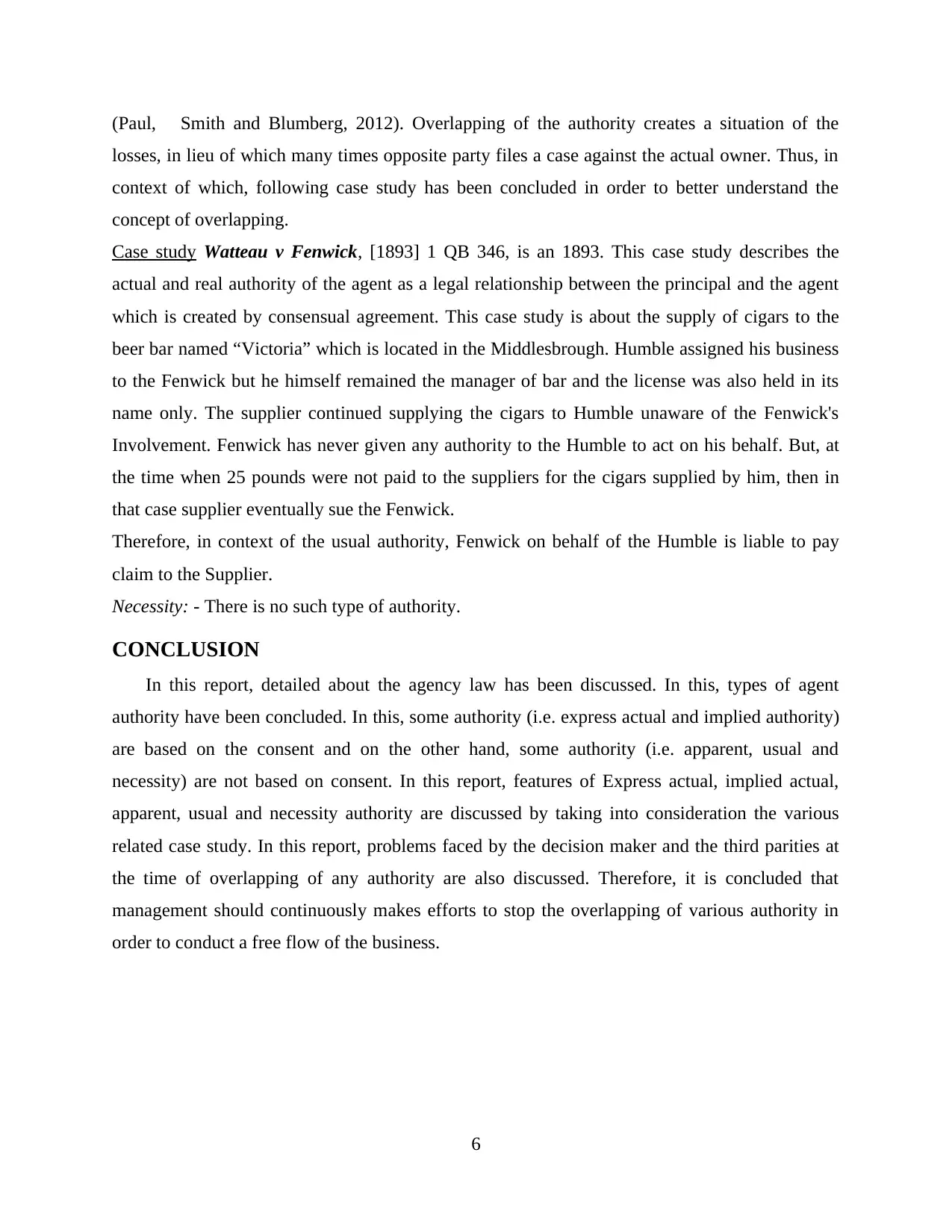
(Paul, Smith and Blumberg, 2012). Overlapping of the authority creates a situation of the
losses, in lieu of which many times opposite party files a case against the actual owner. Thus, in
context of which, following case study has been concluded in order to better understand the
concept of overlapping.
Case study Watteau v Fenwick, [1893] 1 QB 346, is an 1893. This case study describes the
actual and real authority of the agent as a legal relationship between the principal and the agent
which is created by consensual agreement. This case study is about the supply of cigars to the
beer bar named “Victoria” which is located in the Middlesbrough. Humble assigned his business
to the Fenwick but he himself remained the manager of bar and the license was also held in its
name only. The supplier continued supplying the cigars to Humble unaware of the Fenwick's
Involvement. Fenwick has never given any authority to the Humble to act on his behalf. But, at
the time when 25 pounds were not paid to the suppliers for the cigars supplied by him, then in
that case supplier eventually sue the Fenwick.
Therefore, in context of the usual authority, Fenwick on behalf of the Humble is liable to pay
claim to the Supplier.
Necessity: - There is no such type of authority.
CONCLUSION
In this report, detailed about the agency law has been discussed. In this, types of agent
authority have been concluded. In this, some authority (i.e. express actual and implied authority)
are based on the consent and on the other hand, some authority (i.e. apparent, usual and
necessity) are not based on consent. In this report, features of Express actual, implied actual,
apparent, usual and necessity authority are discussed by taking into consideration the various
related case study. In this report, problems faced by the decision maker and the third parities at
the time of overlapping of any authority are also discussed. Therefore, it is concluded that
management should continuously makes efforts to stop the overlapping of various authority in
order to conduct a free flow of the business.
6
losses, in lieu of which many times opposite party files a case against the actual owner. Thus, in
context of which, following case study has been concluded in order to better understand the
concept of overlapping.
Case study Watteau v Fenwick, [1893] 1 QB 346, is an 1893. This case study describes the
actual and real authority of the agent as a legal relationship between the principal and the agent
which is created by consensual agreement. This case study is about the supply of cigars to the
beer bar named “Victoria” which is located in the Middlesbrough. Humble assigned his business
to the Fenwick but he himself remained the manager of bar and the license was also held in its
name only. The supplier continued supplying the cigars to Humble unaware of the Fenwick's
Involvement. Fenwick has never given any authority to the Humble to act on his behalf. But, at
the time when 25 pounds were not paid to the suppliers for the cigars supplied by him, then in
that case supplier eventually sue the Fenwick.
Therefore, in context of the usual authority, Fenwick on behalf of the Humble is liable to pay
claim to the Supplier.
Necessity: - There is no such type of authority.
CONCLUSION
In this report, detailed about the agency law has been discussed. In this, types of agent
authority have been concluded. In this, some authority (i.e. express actual and implied authority)
are based on the consent and on the other hand, some authority (i.e. apparent, usual and
necessity) are not based on consent. In this report, features of Express actual, implied actual,
apparent, usual and necessity authority are discussed by taking into consideration the various
related case study. In this report, problems faced by the decision maker and the third parities at
the time of overlapping of any authority are also discussed. Therefore, it is concluded that
management should continuously makes efforts to stop the overlapping of various authority in
order to conduct a free flow of the business.
6
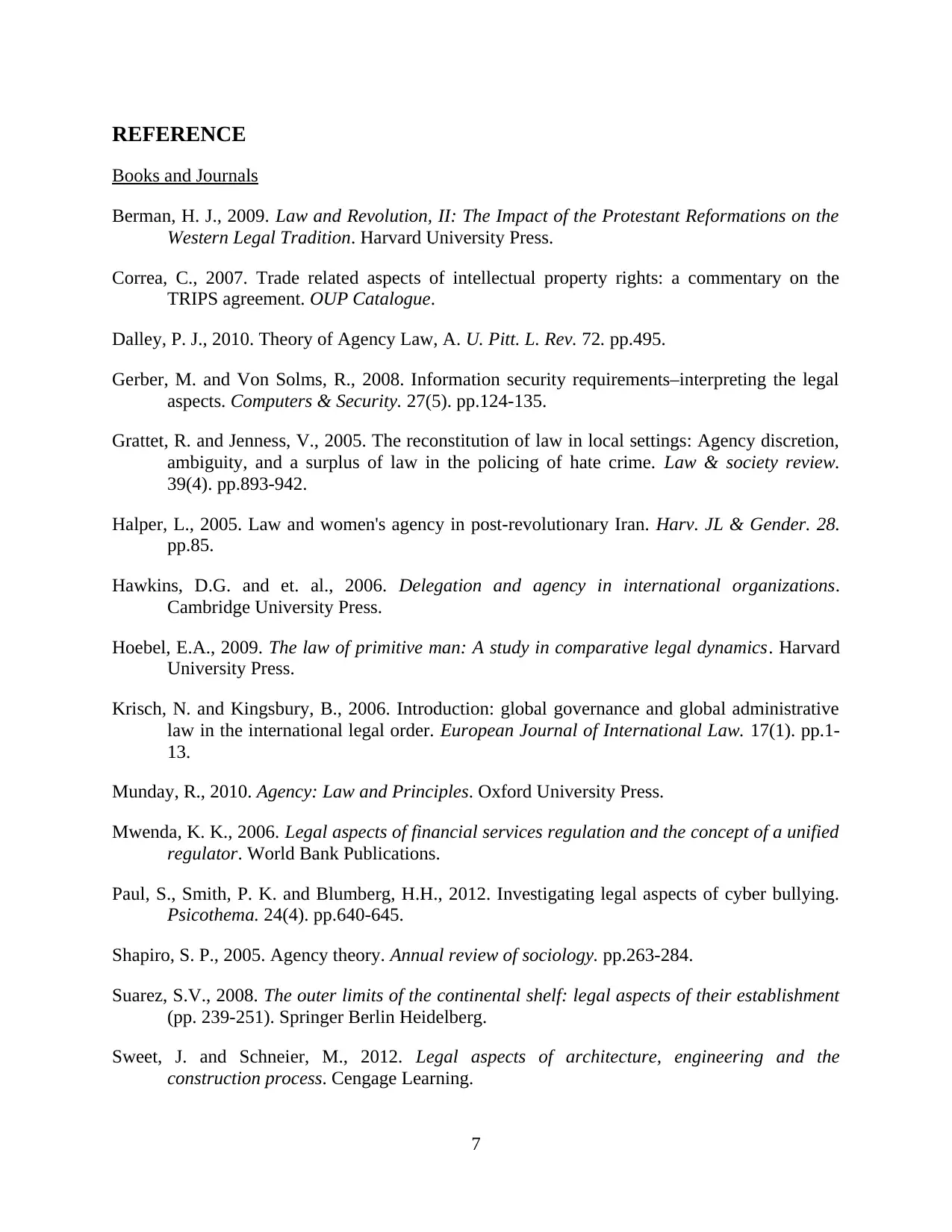
REFERENCE
Books and Journals
Berman, H. J., 2009. Law and Revolution, II: The Impact of the Protestant Reformations on the
Western Legal Tradition. Harvard University Press.
Correa, C., 2007. Trade related aspects of intellectual property rights: a commentary on the
TRIPS agreement. OUP Catalogue.
Dalley, P. J., 2010. Theory of Agency Law, A. U. Pitt. L. Rev. 72. pp.495.
Gerber, M. and Von Solms, R., 2008. Information security requirements–interpreting the legal
aspects. Computers & Security. 27(5). pp.124-135.
Grattet, R. and Jenness, V., 2005. The reconstitution of law in local settings: Agency discretion,
ambiguity, and a surplus of law in the policing of hate crime. Law & society review.
39(4). pp.893-942.
Halper, L., 2005. Law and women's agency in post-revolutionary Iran. Harv. JL & Gender. 28.
pp.85.
Hawkins, D.G. and et. al., 2006. Delegation and agency in international organizations.
Cambridge University Press.
Hoebel, E.A., 2009. The law of primitive man: A study in comparative legal dynamics. Harvard
University Press.
Krisch, N. and Kingsbury, B., 2006. Introduction: global governance and global administrative
law in the international legal order. European Journal of International Law. 17(1). pp.1-
13.
Munday, R., 2010. Agency: Law and Principles. Oxford University Press.
Mwenda, K. K., 2006. Legal aspects of financial services regulation and the concept of a unified
regulator. World Bank Publications.
Paul, S., Smith, P. K. and Blumberg, H.H., 2012. Investigating legal aspects of cyber bullying.
Psicothema. 24(4). pp.640-645.
Shapiro, S. P., 2005. Agency theory. Annual review of sociology. pp.263-284.
Suarez, S.V., 2008. The outer limits of the continental shelf: legal aspects of their establishment
(pp. 239-251). Springer Berlin Heidelberg.
Sweet, J. and Schneier, M., 2012. Legal aspects of architecture, engineering and the
construction process. Cengage Learning.
7
Books and Journals
Berman, H. J., 2009. Law and Revolution, II: The Impact of the Protestant Reformations on the
Western Legal Tradition. Harvard University Press.
Correa, C., 2007. Trade related aspects of intellectual property rights: a commentary on the
TRIPS agreement. OUP Catalogue.
Dalley, P. J., 2010. Theory of Agency Law, A. U. Pitt. L. Rev. 72. pp.495.
Gerber, M. and Von Solms, R., 2008. Information security requirements–interpreting the legal
aspects. Computers & Security. 27(5). pp.124-135.
Grattet, R. and Jenness, V., 2005. The reconstitution of law in local settings: Agency discretion,
ambiguity, and a surplus of law in the policing of hate crime. Law & society review.
39(4). pp.893-942.
Halper, L., 2005. Law and women's agency in post-revolutionary Iran. Harv. JL & Gender. 28.
pp.85.
Hawkins, D.G. and et. al., 2006. Delegation and agency in international organizations.
Cambridge University Press.
Hoebel, E.A., 2009. The law of primitive man: A study in comparative legal dynamics. Harvard
University Press.
Krisch, N. and Kingsbury, B., 2006. Introduction: global governance and global administrative
law in the international legal order. European Journal of International Law. 17(1). pp.1-
13.
Munday, R., 2010. Agency: Law and Principles. Oxford University Press.
Mwenda, K. K., 2006. Legal aspects of financial services regulation and the concept of a unified
regulator. World Bank Publications.
Paul, S., Smith, P. K. and Blumberg, H.H., 2012. Investigating legal aspects of cyber bullying.
Psicothema. 24(4). pp.640-645.
Shapiro, S. P., 2005. Agency theory. Annual review of sociology. pp.263-284.
Suarez, S.V., 2008. The outer limits of the continental shelf: legal aspects of their establishment
(pp. 239-251). Springer Berlin Heidelberg.
Sweet, J. and Schneier, M., 2012. Legal aspects of architecture, engineering and the
construction process. Cengage Learning.
7
⊘ This is a preview!⊘
Do you want full access?
Subscribe today to unlock all pages.

Trusted by 1+ million students worldwide

Yackee, J. W., 2012. Controlling the International Investment Law Agency. Harv. Int'l LJ. 53.
pp.391.
Online
South, N., 2007. The Agency Contract. Available through:
<http://www.e-iure.com/pdf/agency/2007/india.pdf> [Assessed on 3rd January, 2016].
8
pp.391.
Online
South, N., 2007. The Agency Contract. Available through:
<http://www.e-iure.com/pdf/agency/2007/india.pdf> [Assessed on 3rd January, 2016].
8
1 out of 10
Related Documents
Your All-in-One AI-Powered Toolkit for Academic Success.
+13062052269
info@desklib.com
Available 24*7 on WhatsApp / Email
![[object Object]](/_next/static/media/star-bottom.7253800d.svg)
Unlock your academic potential
Copyright © 2020–2026 A2Z Services. All Rights Reserved. Developed and managed by ZUCOL.




